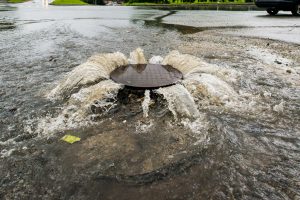An environmental watchdog group is blasting Pennsylvania’s capital in a new report, which finds E.Coli bacteria along the Harrisburg waterfront is about three times the safe level for swimming this summer. Harrisburg’s waterways feed into the Susquehanna River, the Chesapeake Bay’s largest tributary.
The Lower Susquehanna Riverkeeper collected 60 water samples for the nonprofit Environmental Integrity Project (EIP) from June 15 to July 31 of this year, and found 29 violated state health standards. Seven of them had E. Coli at more than ten times safe levels.
An EIP report released this month blames the health hazards on heavy rainfall from climate change, and Harrisburg’s antiquated infrastructure.
The EIP report says sewage overflows have increased by 77 percent in recent years. The study cites water authority records, which show discharges of human waste mixed with stormwater grew from 789 million gallons in 2016, to almost 1.4 billion in 2018.
In one particularly egregious finding, an outfall just downstream from the Governor’s Residence overflowed 64 times last year, dumping more than nine million gallons of sewage and stormwater into the Susquehanna. City Island Park beach, which lies below it, is closed because of high bacteria levels.
Eric Schaeffer, Executive Director of the Environmental Integrity Project and former Director of Civil Enforcement at EPA, said: “The Susquehanna River is the biggest source of water in the Chesapeake Bay, and Pennsylvania is by far the Bay’s biggest polluter. Eliminating these sewage-laden overflows would make the Harrisburg waterfront safer for swimming and also reduce the nitrogen and phosphorus pollution that promote algae growth and low oxygen levels in the Susquehanna and Chesapeake Bay.”
Lower Susquehanna Riverkeeper Ted Evgeniadis calls the bacteria levels “embarrassing,” and is calling on the state of Pennsylvania, along with EIP, to pay for a solution.
“Infrastructure improvements and the construction of underground wastewater storage tunnels can drastically reduce these illicit discharges. Citizens of Pennsylvania, especially those who reside in Harrisburg, should be able to swim and recreate around our state capital without the assumed risk of becoming ill from high levels of bacteria,” says Evgeniadis.
The EIP report recommends the state stepping up to pay for most of the sewer system improvements and the water authority, Capital Region Water, making a long-term plan that allows for increased rainfall from climate change. It also recommends setting deadlines to stop the sewage discharges and stronger penalties for violations.
To read the full report, click here.
Pennsylvania has been criticized for years by other Chesapeake Bay jurisdictions who claim it doesn’t pull its weight in clean water efforts. In response to the EIP report, Pennsylania Governor Tom Wolf’s office says the state is already taking steps to prevent stormwater runoff by increasing green space and reducing impervious surfaces.
In a statement Governor Wolf’s press secretary, J.J. Abbott, says, ” The commonwealth understands the importance of finding ways to minimize the effects of stormwater discharge into our waterways.” Abbott points to a proposed state Storm Water Control Grant Program that would help municipalities implement pollution reduction plans.
-Meg Walburn Viviano




